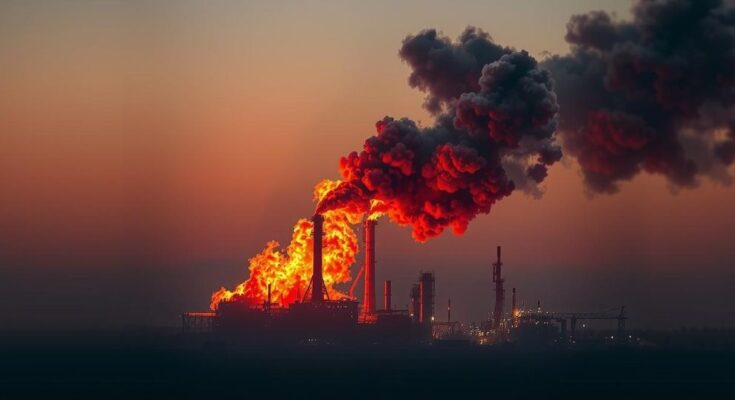Fighting in Sudan’s civil war has ignited the country’s largest oil refinery, sending smoke over Khartoum. Military forces claim to have captured the facility from the Rapid Support Force. The conflict poses dire economic and humanitarian consequences, with severe allegations exchanged between the warring factions regarding control of the refinery. UN officials express concern over the escalation and potential environmental impacts.
Fighting in Sudan’s civil war has led to the ignition of the country’s largest oil refinery, according to satellite data obtained by The Associated Press. The chaos has resulted in thick plumes of smoke rising over Khartoum, as military forces claim to have captured the facility owned by the Sudanese government and the China National Petroleum Corp. This refinery, strategically significant in the ongoing conflict, symbolizes a crucial objective for the military against rebel forces.
The al-Jaili refinery, located approximately 60 kilometers north of Khartoum, had previously endured attacks. Since April 2023, the Rapid Support Force (RSF) has purportedly controlled it, bolstered by landmines placed to hinder military advances. However, the refinery largely remained intact until a recent assault ignited fires throughout the complex, as confirmed by NASA satellite imagery showing significant areas engulfed in flames.
Government forces allege that the RSF intentionally ignited the refinery in a reckless attempt to undermine national infrastructure, while the RSF retaliates with claims that Sudanese military aircraft targeted the facility using barrel bombs. Both parties lack evidence for their accusations, leading to a deadlock. Video evidence surfaced showing military claims of possessing the refinery’s territory, despite RSF’s silence regarding these assertions.
In the midst of this turmoil, the Chinese government, previously Sudan’s largest trade partner, has refrained from public commentary on the incident. This silence follows China’s historical engagement in Sudan’s oil sector following Chevron’s withdrawal in 1992, amid violence targeting oil operations during previous civil unrest. The potential loss of the refinery could severely impact both Sudan and South Sudan’s economic landscapes.
United Nations Secretary-General António Guterres has expressed concern regarding the escalation of violence in Sudan, particularly referencing the refinery attack. He urges the conflicting parties to consider the grave consequences such acts could bear on both Sudan and neighboring regions. Analysts warn that destruction of the refinery could drive Sudanese reliance on costlier fuel imports, further exacerbating the ongoing humanitarian crisis.
Sudan has faced instability since the 2019 uprising that ousted dictator Omar al-Bashir, culminating in a failed democratic transition due to a military coup in October 2021. Amidst ongoing fighting since April 2023, over 28,000 individuals have perished, and millions have been displaced, facing dire humanitarian conditions as the conflict rages on.
The content revolves around the ongoing civil war in Sudan, with specific focus on the fighting around the al-Jaili oil refinery, the largest in the country. This facility is critical for Sudan’s economy and political control amid the conflict between the Sudanese military and the rebel RSF. The article elucidates the aerial and ground confrontations involved, recent escalations, and the ramifications for the local population and international stakeholders, particularly China.
The conflict surrounding the al-Jaili refinery illustrates the severe consequences of Sudan’s civil war, marked by military offensives, accusations of sabotage, and international concerns. As both sides persist in their battle for control, the potential destruction of significant infrastructure exacerbates the humanitarian crisis. The situation remains fluid, with severe implications for Sudan’s future and its economic stability, notably if the refinery’s operations cease permanently, leading to further reliance on expensive foreign fuel imports.
Original Source: www.cnn.com




